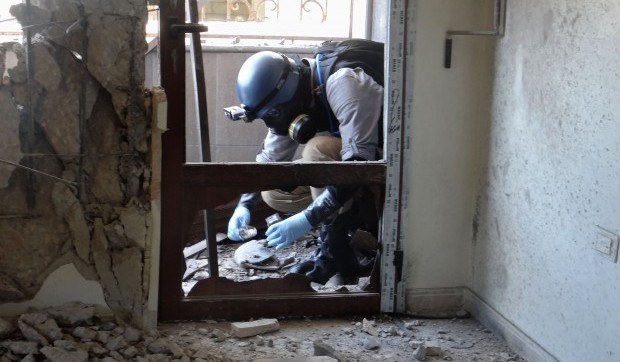Russia has started to pay for the catastrophic mistakes it made in Syria, defending the regime of a criminal who guaranteed himself certain defeat. How did Assad manage that? He placed himself in a bloody confrontation with a people who were determined to get rid of him, while he made the perpetuation of his rule–which is contrary to nature—his only objective. That objective convinced him that a minority could forever use oppression to enforce its rule over a majority that rejected it.
From the beginning of the struggle, Putin’s Russia adopted a vision that saw the Syrian issue as a conflict between fundamentalist Islam and the last of the secular regimes in the region. It did not acknowledge any legitimate demands from an oppressed people, the acceptance of which would have changed its challenged the theory of fundamentalism, whether Islamist or secular. It ignored the blatant fact that Syrian people went out to demand a political system based on citizenship, the rule of law, democracy and freedom. Notably, they didn’t take to the streets under the leadership of a party or a political or sectarian movement, whatever their identity.
By failing to acknowledge the desires of the Syrian people, the clever men of the Kremlin committed a mistake they will be unable to rectify. Even if the Syrian people forgave them their mistake, they could not build normal relations with the new Syria in one day. The Russians have lost the illustrious relations they have had with the Syrian people for more than 60 years, and they have wasted the confidence the Syrians afforded to Russia above all others. They committed themselves to a regime rejected by its own people—a regime that oppressed its people more than any oppressive regime ever known to Arabs.
Russia could have taken advantage of its relationship with the regime’s army and security to stop the destruction of Syria and the killing of its people in massacres that have shocked the world. Instead, Putin welcomed them with glee, as if they were charitable actions taken by a sympathetic regime against a group of monsters and predators who deserved to be killed and crushed.
Putin’s Russia has lost in Syria, because it overlooked the fact that the Syrian people will defeat the Assad regime. But we must still ask if it has won instead among Arabs, in the Middle East, or internationally.
First, Russia failed to understand what was going on in Syria. It did not understand the American–Israeli strategy, and so it felt confident in Assad’s eventual victory and rejected all that the Syrians tried to draw its attention to repeatedly. They didn’t account for Washington and Tel Aviv protecting Assad as long as he continued to destroy the Syrian state and society and eliminate Syria from the power equation in the region. It did not realize that the destruction of Syria, which Russia supported and which used its arms, would represent a permanent source of shame to Russia and a reason to achieve the opposite to what it wanted. The only result has been the rise of fundamentalism on the corpse of democracy.
However, Russia continued to fight alongside Assad, unwittingly contributing to America’s efforts to turn Syria into a hotbed of tension. America has managed to make Syria into battlezone that is attracting its regional and international adversaries, and it is now able to pick them off without sacrificing a dollar, a shekel, or a single American or Israeli soldier.
Now, Washington is taking away Assad’s chemical weapons and it has become clear that the Assad regime has had no objectives in the last half-century apart from remaining in power. Russia’s Putin has been forced to play the role of a broker who could not save Assad, and thus Washington forced him to do what the US and Israel wanted.
America is now beginning to achieve its second objective: to place the Iranian nuclear dossier under its supervision. If it doesn’t get this in the next few weeks, it will tighten its siege of Tehran and escalate its pressure. The US will focus on beating Iran down wherever it has influence, in Syria and elsewhere, while Russia stands helpless—just as it was unable to stop Assad from being forced to hand over his chemical weapons. It will have no option other than to face its strategic defeat in Tehran tomorrow, while still looking back at its strategic defeat in Damascus yesterday.
Putin’s Russia will remain in the position of someone who makes defensive reactions. The strategic equation will remain in the hands of America and Israel, and victory will be theirs. This is true not only because of their abilities, available options, and well-considered policies, but also because of Russia’s and Iran’s involvement in the Syrian crisis. That involvement is weakening them strategically.
What could Russia do other than accept defeat when Tehran consents to its own downfall the way Damascus consented before it? It will only be left with disappointment at Putin and his failures, and it will have to leave a region it entered in the 1950s while trumpeting its promises of liberation and progress. Russia has now been pushed out of the Middle East by the Americans and the Israelis, because it despised the Arab people and ignored their interests and desires. Russia tied its fate to trivial oppressors who never objected to becoming no more than minor servants of America and Israel’s plans and strategies.
Russia has carried out some truly stupid policies, which Washington deliberately lauded as very smart, policies, in order to make Putin’s fall more painful and more costly—as we can see today.
